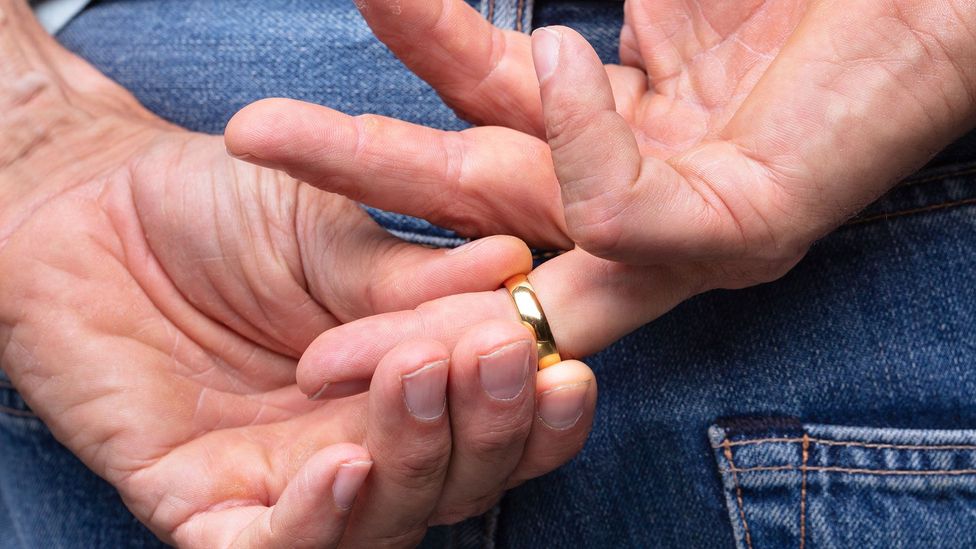Person That Is Unloyal Once Will Be Unloyal Again
Why we demand to talk about cheating
(Image credit:
Getty Images
)

Nosotros might exist predisposed to think the all-time in our partners, but perchance we shouldn't be so trusting
M
Mike Pence refuses to dine solitary with women other than his wife. For the United states vice president it is a mark of respect for his wife, Karen, and a rule guided past his strong religious convictions. Some commentators take hailed it the solution for men unable to control themselves, others call information technology patronising, sexist and insulting. (It is non an entirely rare attitude, however: in one study, effectually v.seven% of people surveyed thought that ownership food for someone of the opposite sex would qualify as an act of infidelity.)
Whatever you lot think about Pence's justifications, at least he and Karen have articulate boundaries about what is appropriate to do with people of the reverse sexual practice – which is more than tin can be said for a lot of heterosexual couples.
Nigh people rarely have skillful definitions of exactly what information technology ways to be unfaithful, and vastly underestimate how likely it is that some kind of betrayal will occur (despite being unfaithful themselves). They also have little agreement of how they will deal with infidelity if it does occur (with many people'southward reactions surprising them).
Given its prevalence, that's lack of communication and understanding is causing a lot of heartbreak – and many psychologists suggest that nosotros should take much more open conversations about cheating.
Yous might too enjoy:
- How authentic are our showtime impressions?
- Are your friends bad for your health?
- The dark side of believing in truthful dearest
Working out how many people have always been unfaithful is challenging, not least considering researchers are reliant on the honest confessions of cheaters. Every bit a result, estimates of infidelity can vary wildly and are ofttimes affected by how data are collected. At the higher stop of estimates, 75% of men and 68% of women admitted to cheating in some way, at some point, in a relationship (although, more up-to-engagement research from 2017 suggests that men and women are now engaging in infidelity at similar rates). One of the lowest published rates of infidelity is 14% – still a sizeable number.
Still but 5% of people believe that their own partner had cheated or volition crook at some point in their relationship, pregnant that fifty-fifty the almost conservative estimates would suggest that this happens much more than oftentimes than expected. Perhaps we're too trusting of our partners.
"Those of us who are not depressed by and large have a actually inflated sense of how likely practiced things volition happen and unduly low sense that bad things volition happen," says Susan Boon of the Academy of Calgary. "1 possibility is that our low presumption that our partners will cheat on usa is a manifestation of that. Alternatively, when you are in a human relationship information technology might be helpful to take faith in your partner because it would be unhealthy to monitor their behaviour all the time."
Hither lies ane of the issues; cheating means different things to dissimilar people. Researchers might pre-define what cheating constitutes to them, but anybody has a different interpretation, so interviewees might not concord with them.

For around one in 20 heterosexual people, simply buying a meal for someone of the opposite sex is considered to exist a expose (Credit: Getty images)
"People overestimate the extent to which others approve of and appoint in infidelity in relation to how much they do," says Benefaction. "I'1000 not sure why people don't talk about information technology considering how oftentimes you see it in movies or songs. Part of it is that nosotros're not aware of the variability of standards. We assume wrongly that what I consider unfaithful you would too. It also admits that perhaps this could happen. People would adopt to believe that you wouldn't practise this."
About lxx% of people have not discussed with their partner what counts as adulterous. Does downloading a dating app count, for instance? Between 18% and 25% of Tinder users are in a committed relationship while using the dating app. Presumably, meeting up with people yous met on Tinder does. Unsurprisingly, Tinder users who are already in relationships are more likely to have coincidental sex.
The people responding to the question about whether they thought their partner had ever been unfaithful were free to interpret infidelity in whatsoever mode they chose. Perhaps that makes the 5% statistic even more surprising. For some people, cheating might merely include sexual activity, only for others, flirting with someone might count. With the freedom to interpret adultery as nosotros wish, nosotros're even so very optmisitic that it volition never happen to us.
Defining emotional infidelity is especially difficult. Ane place where emotional transgressions might occur is in the workplace where overlapping professional person and personal interests result in close relationships. Plausibly this would allow for opportunities to transgress from innocuous friendships to something more than intimate.
In one study, researchers interviewed women about their attitudes towards workplace relationships. These women, all in their 30s and 40s and in committed relationships, were asked about times they felt the lines between appropriate and inappropriate workplace relationships became blurry.
"I tin't prevarication, I look forward to seeing him at work," said one interviewee, "it feels similar a stupid schoolhouse girl, you lot know, like when yous take a crush on somebody and you see them and y'all're like 'Oh!' and you get excited."
The interviewees concluded that physical intimacy is not necessary to elicit feelings of emotional adultery. Withholding information, confiding in another, even thinking nigh the other person if information technology prevents you from thinking about your partner were enough. These are all things that might happen considering the amount of fourth dimension nosotros spend at work and the nature of forming close relationships with coworkers.

Around lxx% of people cheat on their partner at some time in their lives (Credit: Getty Images)
The interviewees talked about 'relationship safeguarding'; predefining basis rules about what is and what is non advisable. They also said that choosing to trust their partners was important for maintaining a healthy relationship. "And being in fitness, it can become physical just because [I'm] trying to evidence people how to do the correct workouts," said another interviewee. "So, it was a conversation that we had to have... ahead of time just to say, 'I'm going to trust yous to do your job and it won't go beyond that'."
The behaviour of your partners friends tin be enlightening as to their own attitudes about infidelity. The greater the proportion of your friends who y'all believe have cheated in their relationships, the more likely you are to take cheated in the past, and the more likely yous are to say that y'all would be willing to cheat again in the future. We tend to surround ourselves with similarly cheating, or non-adulterous, people.
Information technology is articulate that almost people in monogamous relationships call up that cheating is morally wrong. But, if someone has cheated, is the best course of action to admit guilt? When asked this question past researchers, people tend to say yes. In fact, more than xc% of people questioned say they would want to know if their partner has cheated on them.
1 piece of research suggests that the importance of actualization loyal and pure is a fundamental reason why people make those moral judgments. In fact, maintaining loyalty is more than important than protecting someone's feelings. If the well-nigh of import matter was non to cause damage, so people would accept said that keeping the affair underground is more ethical than confessing. Whether in reality this is the best course of action is another matter. Infidelity is the number 1 crusade of divorce in the U.s.a..
Admitting to cheating is conspicuously going to hurt your partner's feelings – but at that place is a lot of variation in how people react. Greg Tortoriello, a psychologist at the Academy of Alabama has studied the effects of perceived failure on people; particularly, people whose personalities might mean they react poorly to failure. I instance is narcissists, who seek the approval of others and are very conscious virtually how they present themselves.
"Nosotros assessed two types of narcissists: grandiose narcissists and vulnerable narcissists," says Tortoriello. "A grandiose narcissist has an inflated sense of cocky-worth linked to higher self-esteem, whereas a vulnerable narcissist is sensitive to judgements from others and usually has lower self-esteem. In both cases, slight threats can activate ambitious behaviour."
In one report past Tortoriello, participants imagined their partner was engaging in various types of adultery. Some of the imaginary infidelities were based on emotional experiences; your partner talking late at dark on the phone with another person and responds to their text rather than yours. Others were sexual.

Personality traits like narcissism tin can strongly influence how people answer to infidelity (Credit: Getty Images)
"Grandiose narcissists wanted to assert power and control over their relationships when in that location was a threat of emotional adultery," says Tortoriello. "This took the form of exact threats, physical threats, surveillance – remember these were hypothetical responses to imaginary situations. What we didn't find is that those infidelity threats aroused more than negative emotions."
Vulnerable narcissists subsequently emotional infidelity spent more than time worrying and had more negative emotions. They took the infidelity personally.
In clinical terms, diagnoses of narcissism equally a pathological disorder tend to exist black and white – yous are either a narcissist or you are non. Most behavioural psychologists similar Tortoriello view narcissism as a sliding scale – everyone can be judged to have some of these qualities to a greater or lesser extent. In this study, he was specifically looking at people who were above average for these traits but who were not necessarily pathologically narcissistic.
"If you are in a relationship with one of these people and cheat sexually, it pretty much looks like they are trying to assert authorization and that will manifest in fairly subversive behaviours, but information technology gets more complicated with emotional infidelity," says Tortoriello. "Vulnerable narcissists may non communicate to you that there are these concerns around their relationship and at that place is turmoil in the relationship. If I were to propose an intervention I would say finding ways to cultivate communication in specifically these relationships where there are a lot of internalised negative emotions is important."
Forgiveness is most likely when cheating is an isolated incident and when an apology is offered. Though, Tortoriello and Boon reiterate that people react very differently in hypothetical situations and in reality. "Unanimously people say they would break up with someone for cheating merely in reality it is non how people reply," says Boon. "Sometimes it's the end of marriages merely not e'er."
Tortoriello has started to think about collecting real life data and is bully to explore the version of events from both sides of a couple. Practise our partners think we're being more than unfaithful than we do? Do they meet adulterous where others encounter harmless flirting?
1 thing to consider is that although the lifetime prevalence of infidelity is high – it will probably happen to many people at some bespeak – the odds in whatever particular yr are probably quite low. It doesn't seem peculiarly pressing to talk most it correct now.
--
William Park is @williamhpark on Twitter.
Join one million Future fans by liking us on Facebook , or follow us on Twitter or Instagram .
If you liked this story, sign up for the weekly bbc.com features newsletter , called "The Essential List". A handpicked selection of stories from BBC Future, Civilization, Capital letter, and Travel, delivered to your inbox every Friday.
Source: https://www.bbc.com/future/article/20190625-why-we-need-to-talk-about-cheating
0 Response to "Person That Is Unloyal Once Will Be Unloyal Again"
Publicar un comentario